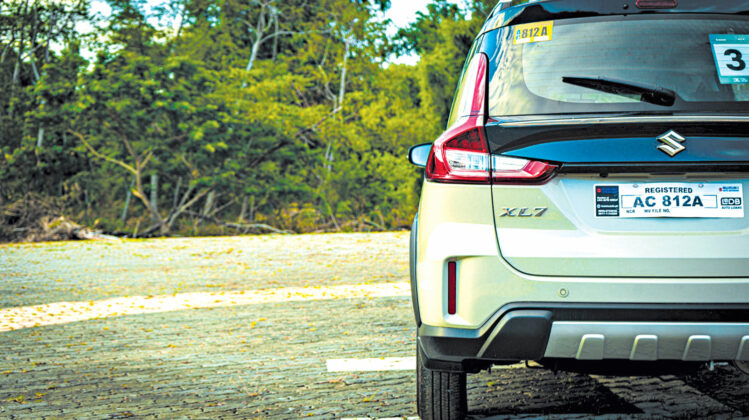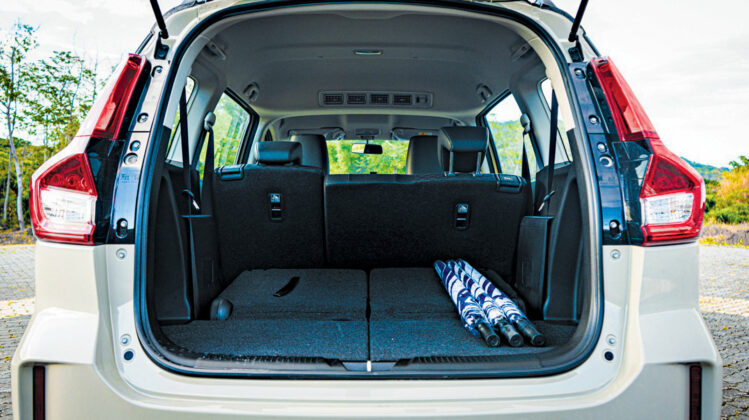Groupthink
FILIPINOS LOVE to move in groups. That truism explains why the multi-purpose vehicle (MPV) remains a vibrant segment in the industry. The challenge therefore is in moving more for less — while keeping a keen eye on quality.

Mild-hybrid, mild-spicy fun with the Suzuki XL7
FILIPINOS LOVE to move in groups. That truism explains why the multi-purpose vehicle (MPV) remains a vibrant segment in the industry. The challenge therefore is in moving more for less — while keeping a keen eye on quality.
One could make an argument that Suzuki has mastered this formula, which explains the success of its seven-seater Ertiga. It is a beyond-the-basics econobox that has been a popular model for a while now. Last year, the Ertiga — which now comes equipped with a mild-hybrid powertrain — sold a healthy 2,805 units.
Coming at a price of P954,000 for the GA MT, there was additional excitement over the fact that the Ertiga initially qualified for coding exemption from the Unified Vehicular Volume Reduction Program (UVVRP), until that privilege was taken back. However, market reception for the good-quality, value-for-money MPV continued to be warm for SPH.
Following in the footsteps of its more affordable sibling, the XL7 is also now fitted with a mild-hybrid powertrain, wherein a 12V electric motor provides supplemental grunt whenever possible to an internal combustion engine. Based on Automobile Association Philippines (AAP)-administered testing, the XL7 attains an attractively frugal fuel economy rating of up to 22.029 kilometers per liter of gas. This rate was mustered while the vehicle had two occupants, and maintained an average speed of 60kph to 70kph.
Starting at P1.252 million, the XL7 obviously breaches the usual psychic barrier of P1 million, but you have to remember that the lower price bracket is occupied and served by, yes, the Ertiga. While still not an all-new model, the XL7 deserves a serious look for car browsers who want to dip their feet in electrification, and maybe get a taste of the fuel-saving benefits that comes along with it.
Aside from the (mildly electrified) powertrain, there are a lot of other niceties that distinguish this same-gen, albeit upgraded XL7 from its older iteration.
It sports a new tailgate garnish which has a silver accent. On the instrument panel within, the vehicle gets a carbon-fiber finish. A black marble texture, again with a silver accent, is on the doors for a decidedly more premium look. Meanwhile, the XL7 now has follow-me-home or lead-me-to-vehicle headlamps, which improve on convenience and safety. The MPV also gets cruise control, as well as a fuel-saving engine auto-start-stop feature — which switches off the engine during stops like at a traffic light and engages it when the throttle is pressed. The instrument cluster has been refreshed, but still features a pair of analog gauge windows — tachometer and temperature on the left, speedometer and fuel gauge on the right — flanking a digital multi-information display.
The center-stack infotainment screen measures 10 inches, and boasts compatibility with either Apple CarPlay or Android Auto. Two cup holders in front are ventilated to help keep cold drinks cold.
Under the hood is the familiar KB15B heart — a 1.5-liter DOHC mill, submitting 77kW at 4,400rpm and 138Nm at 6,000rpm. An electric motor provides 1.77kW of aforementioned electric assist.
The hybrid battery is recharged through deceleration, and kicks in when the vehicle is cruising — reducing engine load. It similarly aids in more miserly fuel consumption by giving the ICE some assistive grunt when starting from a standstill and even during acceleration.
The XL7 is positioned by Suzuki Philippines (SPH) as an SUV, but I think it’s a perfect example of an MPV, done the right way for its price point. The second-row room is pretty decent and well-spaced from the first row, and the air-conditioning is decent and adequate. As for the last row, it really depends on how tall you are whether you should even give it a try or not. The large second-row doors swing wide to provide ingress/egress ease to both the second and third rows, with the third-row passengers needing to push forward the second row to gain access. Persons of average height could expect a decent experience in the rear bench — particularly since it is elevated to give occupants a clear line of sight to the air-conditioning vents on the ceiling, and presumably to help mitigate any feeling of claustrophobia. The 50:50 split third-row seats can recline separately by up to 16 degrees.
The front armrest opens to swallow small items and such, while the second row boasts a smartphone holder. To the bottom left of the steering wheel column is a banknote/coin holder with partition, and door pockets in front accommodate a bottle of up to one liter in size — same with the third row (which also includes an accessory socket).
With regard to its cargo capacity, SPH reports a “maximum volume” of 803 liters for the XL7, and when the third-row seatback is folded and luggage board lowered, it’s at 550 liters. There’s also wide opening in the rear — a height of 850mm and width of 980mm. For more valuable items, users can actually stow them away from prying eyes through a removable floorboard at the back of the third row. This is 170-mm deep and 440-mm wide from seatback to rear.
The 1.5-liter mill isn’t the most powerful of engines, but it gets the job done for a point-A-to-point-B mover. What it delivers is consistent, reliable performance while keeping close tabs on fuel consumption.
Sharing the Heartect platform with the Ertiga, the XL7 is said to similarly benefit from the “smoothly curving frame’s” underbody stiffness leading to “excellent fundamental vehicle performance while contributing to collision safety by efficiently dispersing energy.”
In an interview, Suzuki Philippines Assistant to the General Manager and Auto Sales Department Head Nasuki Yakagawa said, “We are very excited to introduce another hybrid model to the public, and we invite people to test the superior performance and more eco-friendly features of the XL7. We are focusing on fuel efficiency as our part in contributing to environmental care. We look forward to expanding our hybrid offerings in the market. As the price of fuel goes up, we see that a lot of our customers are also interested in fuel efficiency.”
The Suzuki XL7 surely makes a solid case for consideration as a fuel-saving people mover that gives a reasonable amount of spice and substance for someone looking to go beyond basics. Time to think about the group.




















